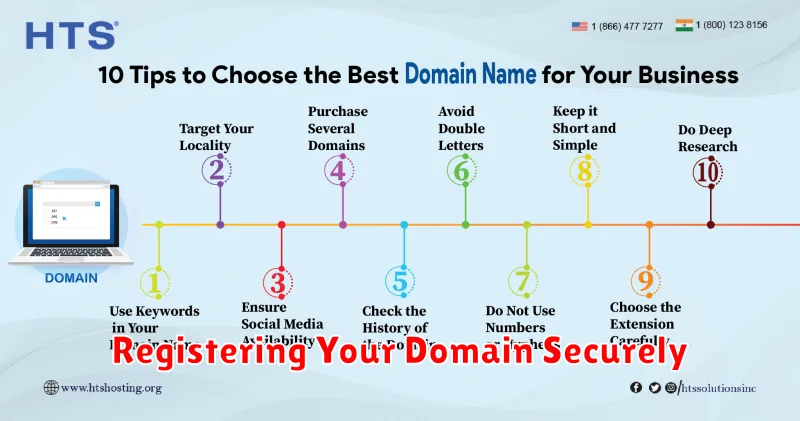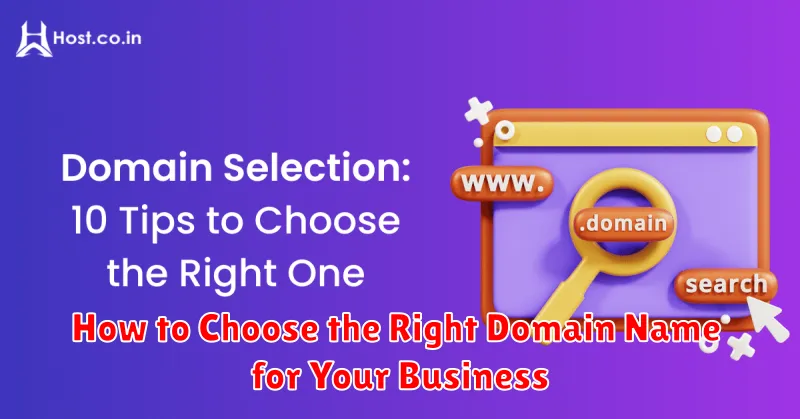Choosing the right domain name is a critical step in establishing your online presence. Your domain name is more than just a web address; it’s your online identity, your brand’s digital storefront, and the first impression many potential customers will have of your business. A well-chosen domain name can significantly impact your website traffic, search engine rankings, and overall brand recognition. This guide will provide you with essential strategies and considerations for selecting a domain name that effectively represents your business and drives online success.
This article will cover a range of factors crucial to domain name selection. From understanding the importance of keywords and brand alignment, to navigating the complexities of domain extensions (like .com, .org, .net) and domain availability, we’ll equip you with the knowledge necessary to make an informed decision. Whether you’re launching a new venture or rebranding an existing one, selecting the perfect domain name is an investment in your future. By following the advice outlined here, you can secure a domain name that not only supports your current business objectives but also allows for future growth and expansion.
Why Your Domain Name Matters
Your domain name is more than just a web address; it’s a crucial element of your online identity. It’s often the first impression you make on potential customers, and a strong domain name can significantly impact your brand recognition and online success. A poorly chosen domain name, on the other hand, can hinder your visibility and credibility.
A well-chosen domain name makes your website easy to find and remember. It contributes to building trust and professionalism, making it more likely that visitors will engage with your content and ultimately become customers. Think of it as your online storefront; it needs to be attractive and inviting.
Tips for a Memorable Domain
A memorable domain is crucial for online success. Keep it short and simple to avoid typos and make it easy to recall. Use keywords relevant to your business, helping users understand your offerings quickly.
Avoid numbers and hyphens. They complicate the domain and can make it seem less professional. A clean, concise domain builds trust and reinforces your brand.
Lastly, choose the right extension. While .com is the most common and generally preferred, consider other extensions like .net or .org if they better suit your business.
Using Keywords Strategically
Keywords play a crucial role in domain name selection. A relevant keyword can significantly improve your website’s search engine visibility. Think about the terms your target audience would use to search for your products or services.
Incorporating a primary keyword, if possible, directly into your domain name can be beneficial. However, avoid keyword stuffing, which is the overuse of keywords. This practice can harm your site’s credibility and search engine ranking.
Prioritize relevance and clarity over keyword optimization. While keywords are helpful, a clear and memorable domain name is paramount. Focus on a domain name that reflects your brand and is easy for customers to recall and type.
Avoiding Numbers and Hyphens
Using numbers and hyphens in your domain name can create confusion and reduce memorability. A spoken domain name containing a number requires clarification (“Is that the number five, or the word ‘five’?”) and hyphens necessitate careful pronunciation. This added complexity can lead to lost traffic as users misspell or misremember your address.
Prioritize clarity and ease of recall. A clean, concise domain name is significantly easier to share verbally and type correctly, directly impacting your website’s accessibility and overall success.
Choosing the Right Extension (.com, .io, etc)
The domain extension, also known as the top-level domain (TLD), is the part of your domain name that comes after the dot (e.g., .com, .org, .net). Choosing the right extension is crucial for your brand identity and online presence.
While .com remains the most popular and recognized extension, others offer specific connotations. .org is typically used by non-profit organizations, while .net is often associated with network infrastructure. Newer TLDs like .io have become popular with tech and startup companies.
Consider your target audience and industry when selecting an extension. If your business operates internationally, consider country-specific TLDs (e.g., .uk, .ca). Prioritize a .com if possible due to its widespread recognition and trust.
Checking Availability and Trademarks

Once you have a list of potential domain names, the next crucial step is to check their availability. Use a domain registrar’s website to see if your desired names are available. If your top choice is taken, consider variations or different extensions (.com, .net, .org, etc.).
Equally important is checking for trademark conflicts. A domain name can infringe on existing trademarks, leading to legal issues. Conduct a thorough trademark search to ensure your chosen domain doesn’t violate any registered trademarks. This proactive approach can save you significant trouble down the line.
Matching Social Media Handles
Once you’ve secured your domain name, immediately attempt to register matching social media handles. This creates a consistent brand presence across platforms, making it easier for customers to find and connect with you. Consistency is key for brand recognition.
Prioritize platforms relevant to your target audience. Don’t feel obligated to be on every platform. Focus on where your customers are most active. Availability may be an issue, so consider slight variations if your exact match isn’t available. For example, adding “Inc” or “Official” can be a workaround.
Buying a Premium Domain
A premium domain name is a high-value, often short, and memorable domain name that is already registered. These domains are typically more expensive than registering a new domain because of their existing authority, brandability, and potential to attract traffic.
Benefits of owning a premium domain include increased brand recognition, improved search engine rankings, and a higher perceived value for your business. They are often easy to remember and type, contributing to a more professional online presence.
Considerations before purchasing a premium domain include budget, relevance to your brand, and potential return on investment. While a premium domain can be a valuable asset, carefully evaluate if the cost aligns with your overall business strategy.
Redirecting and Forwarding Options
Once you’ve secured your desired domain name, understanding redirecting and forwarding options is crucial, especially if you’re dealing with multiple domains or an existing website.
Redirecting permanently directs visitors from one domain to another. This is beneficial if you’ve permanently switched to a new domain and want to ensure all traffic goes to the correct location. It helps maintain SEO by passing authority to the new domain.
Forwarding, on the other hand, temporarily sends visitors to a different URL. It’s simpler to set up but can be confusing for users and search engines as the original URL remains in the address bar. This option is less ideal for long-term solutions.
Registering Your Domain Securely

Once you’ve chosen your perfect domain name, secure registration is crucial. Choose a reputable registrar. Compare pricing and features, but prioritize security and reliability.
Enable two-factor authentication (2FA) on your registrar account. This adds an extra layer of security, making it significantly harder for unauthorized access.
Consider domain privacy protection. This service masks your personal contact information in the public WHOIS directory, shielding you from spam and potential identity theft.

